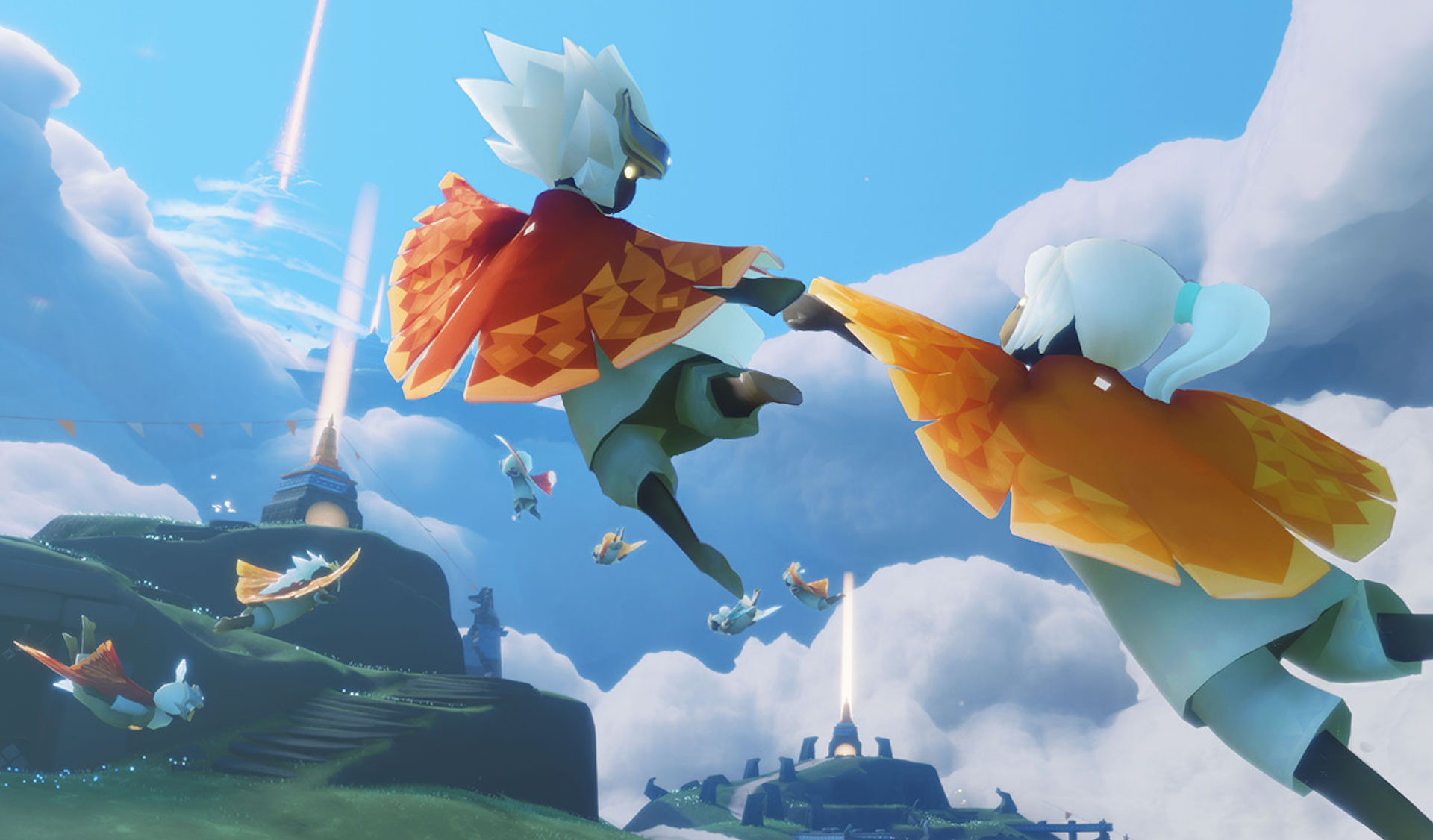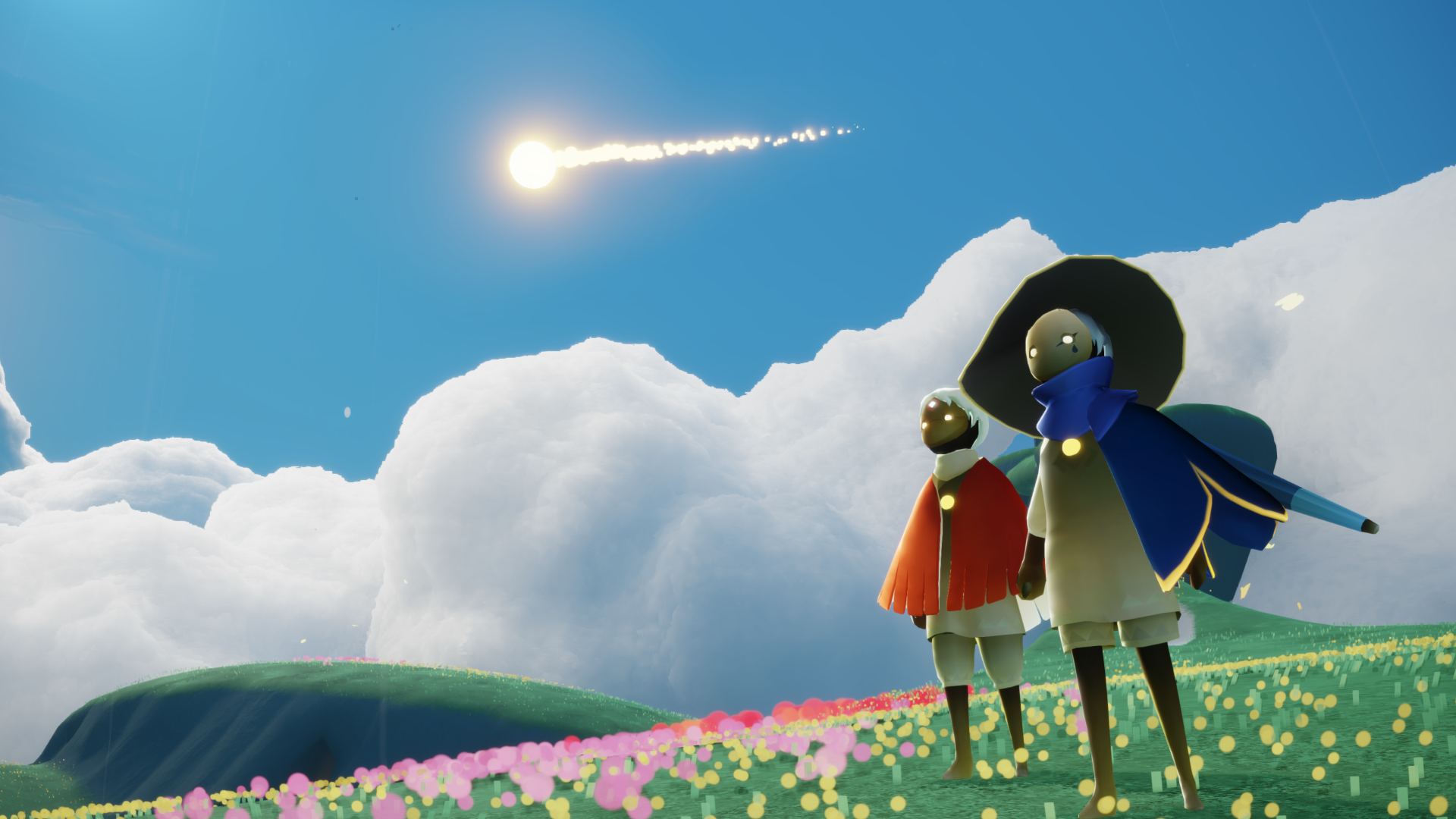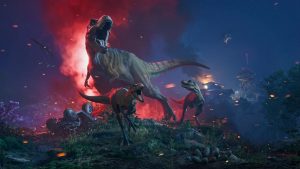
Thatgamecompany’s track record speaks for itself, with games like Flow, Flower, and Journey having taken the world by storm when they first came out. Their fourth game, Sky: Children of the Light, was at the same time fresh and familiar. Though it’s based on a free-to-play model and launched first on mobile devices, it is characterized by much of the same serenity, beauty, and synergy of multiple aspects of the same experience as something like Journey. Soon, the game will be out on multiple more systems, and recently, we sent across some of our questions about the title to its developers. You can read our interview with designer Atlas Chen below.
"We want all disciplines, from music, audio, art to game design to play together. When everything resonates with each other and deliver an emotional catharsis, people tend to reflect on what was happening. That self-reflection is when the positive changes happen."
Journey was obviously a huge game for you guys, and will always be considered one of the greatest games of its kind. What were the lessons that you took from its development and reception going into Sky?
I joined thatgamecompany in early 2017 in the middle of Sky’s development. Journey was the game that inspired me to work on my indie game Gemini – A Journey of Two Stars 6 years ago and to join TGC after it was shipped. I still remember the day I first played Journey and was so touched by the artistic level it achieves. In these years working at TGC, I definitely learned even more about Journey and its design philosophy and practice.
TGC has constantly been in the pursuit of creating timeless games that can inspire people for positive changes. I think there are two important parts to achieve this goal in Sky – first, the game’s story, or as we call it, the narrative arc; and second, players’ bonds with each other.
In Journey, TGC crafted a dramatic arc to deliver the catharsis. It’s like conducting a symphony, you want all the different instruments to play the same music sheet. We want all disciplines, from music, audio, art to game design to play together. When everything resonates with each other and deliver an emotional catharsis, people tend to reflect on what was happening. That self-reflection is when the positive changes happen. We learned these from Journey and we certainly built on that experience to create the core game loop in Sky.
We also learned how to establish a positive relationship between two strangers just met. “If all you have is a hammer, everything looks like a nail.” In a video game, if you give players a gun, nothing good can come out of this. To foster positive relationships, it is important to take out the tools that people could use to harm each other. Journey, for example, provides no physical interaction between players so they can’t hurt each other. It also limits the communication to a musical shout and does not display the other player’s name, so there is no chance for toxicity languages. On top of that, you want to give player tools to help each other. The two players in Journey will charge each other for the energy to hover, which is a mutually beneficial situation for players who stick together.
In Sky, social dynamics is much more complex. We allow up to 8 players to be connected which is a much more complex dynamic. We also provide the progression of the relationship, which unlocks much more intimidate interactions between players, including holding hands, chat, etc. But the rule of no harming each other, and mutually benefiting, still applies to all our design. This shapes the player’s relationship towards a friendly one. As a result, one of my colleagues from the community team told me that Sky’s player community is the most positive and polite one she has ever seen in her career.
Reception wise, we were inspired by players sharing the stories that they are moved to tears, such as situations that someone showed empathy to them, helped them, and even sacrifice for them. We designed Sky with these player stories in mind to create the rules and space to encourage people to take care of each other. But we do not force these moments to happen. We understand that relationships are only genuine when you have choices. In Journey, we didn’t force players to stay together. They could leave if they want to. Thus, people who choose to stay with you are people who truly want to.
"I’d like to think of Sky as a place where you can re-experience childhood when you can make friends with any other kids running around on the playground, without judging if they are rich or poor."
Games on mobile devices often struggle to find the perfect balance between monetization and progression. What was the approach that you took to finding that balance with Sky?
I think a good approach comes from a clear goal. Money is not our goal, but a way for us to achieve our mission to bring positive changes to players, the gaming industry and society as a whole. Thus, we always put players in our first place when making decisions. For example, the core content of Sky is fully playable without paying at all. We intend Sky to be an inclusive game for everyone. I’d like to think of Sky as a place where you can re-experience childhood when you can make friends with any other kids running around on the playground, without judging if they are rich or poor. There are people from less developed countries or regions, and there are kids and students, and many others who can’t afford paid contents. We want them to be able to enjoy the full emotional journey as well, and we want them to be a part of the player community without feeling inferior to others. Even for the paid contents in the seasonal events, we provide the gifting options for the generous people who want to help out their friends that can’t afford the passes, so players from all over the world have the opportunity to enjoy the same game together.
We advocate for conscious spending and generosity towards other players. We don’t want our players to spend a crazy amount of money and ruin their life. We also don’t want them to play unhealthily long hours and that’s why we limit the amount of grinding you can do per day. We try to avoid driving the monetization with negative emotions, impulsions, or unhealthy addiction, which is uncommon in the modern world of consumerism. We only want people who truly enjoy the game to spend money on the game. If players get tricked into paying for something they will regret, that is a failure, not a success for us.
Now it may be easy to say this, but before we launched the game we had no idea whether it would be a total failure or any success as a business. It turns out that players who do love the game really want to support us. When we launched Sky, we heard tons of feedback from our players that they love the game so much, and complain that they can’t figure out how to pay and support us. I admit that we are not the smartest in terms of monetization. But the fact that we still manage to sustain and can even continue to grow after the game’s initial lunch with these tremendous amounts of love and support from our player community, shows me that when we really care about the players and provide true values to them, the good karma will return.
With that in mind, as we improve the experience of Sky as a living service, we always ask ourselves: Would players be happy about this change? What is the value we are providing to them? Does this make players’ experience more enjoyable? Is it promoting positive behaviors like generosity, gratitude, collaboration, empathy, and altruism among players, or is it triggering toxicity in the community?
Is a free-to-play model something that you want to keep exploring for your games in the future as well?
I think so. As I mentioned before, inclusiveness is one of our key product value. As creators we all want people to enjoy the work we created.
With the upcoming console and PC releases of the game, is there anything that you’re going to look to add to the experience in terms of content, or is the focus more on making sure that the game is optimized well for each individual system?
We can’t share anything else that is new besides what has been announced so far. Our first concern is always how it would impact the player’s experience and the community?
Sky: Children of the Light recently entered its fourth seasonal event. As far as post-launch support is concerned, how much of a long-term plan do you have for the game? Can you perhaps tease some of the things you have planned for upcoming seasons?
We have our year-long plan internally and we anticipate many, many years to come with Sky growing into an even more beautiful and vivid world. We really care for the community where so many players have shown a tremendous amount of dedication and support. We are also hiring to expand the team so we can continue to provide high-quality content and timely updates to serve our beloved player community.
The next season is currently under development, and we have more seasons in the planning. We are closely listening to the feedback from the community for our previous updates, and are excited to keep improving Sky with players together.
"We have our year-long plan internally and we anticipate many, many years to come with Sky growing into an even more beautiful and vivid world. We really care for the community where so many players have shown a tremendous amount of dedication and support."
With next-gen consoles launching just months from now, are you considering PS5 and Xbox Series X releases for Sky: Children of the Light as well?
We don’t have any details to share beyond what is announced. Generally speaking, our goal is that Sky could be accessible to as many players as possible. But we are also a very small team in the growing pain of learning how to operate an online service. I think it’s also important for us to keep the team focus and do things step by step.
Backward compatibility is something both new consoles are banking on quite heavily. How much of an impact do you think it will have from the perspective of both, developers and consumers?
I think it’s great news for both sides. I believe real masterpieces are timeless and shouldn’t be obsolete just because new platforms are coming out or the operating systems getting updates. Many masterpieces of games that touch the deepest level of human hearts were released near the end of each console era, while early games of a new platform tend to be showcases of the technology. That’s a natural business decision since it’s less risky to take advantage of the new platforms’ quantifiable stats instead of relying on the unquantifiable craft of the creative minds. However, with backward compatibility, hopefully, developers of early titles of the consoles will want to put more effort into the emotional experiences since they will be competing with the lasting masterpieces from the previous era.
On the other hand, this will probably be good news for many indie developers. We all know porting can be time-consuming and expensive for a small team that is struggling to survive. If they could focus their energy on the game’s experience rather than the technical hurdles to port the game to both new and old platforms, I think that is liberation for many indie teams with the creative spirit. For players, it may be much easier to update to a newer platform or purchase their first console since they don’t need to say goodbye to a lot of games they love, and worrying about not many games to play on the new platforms.

















